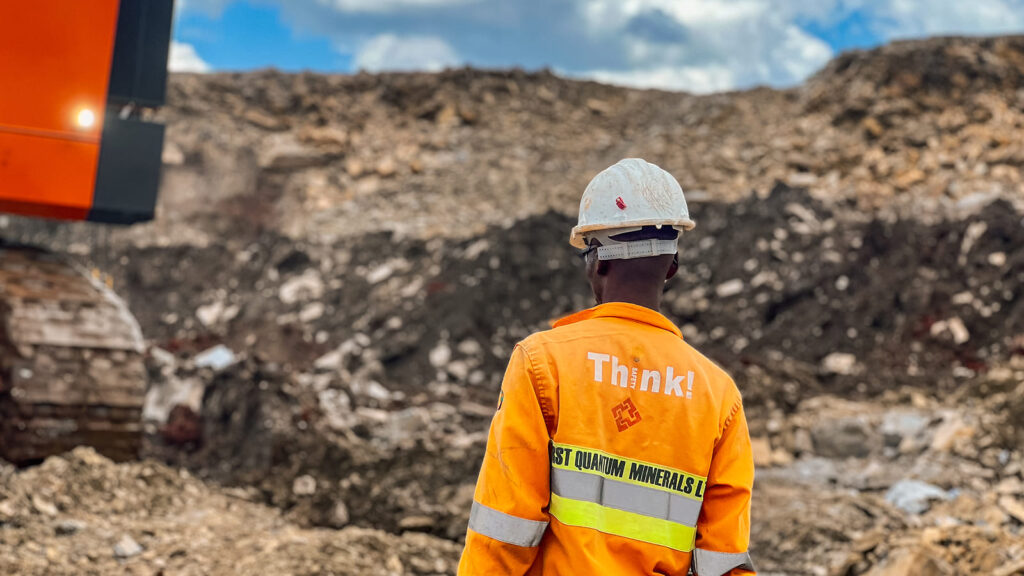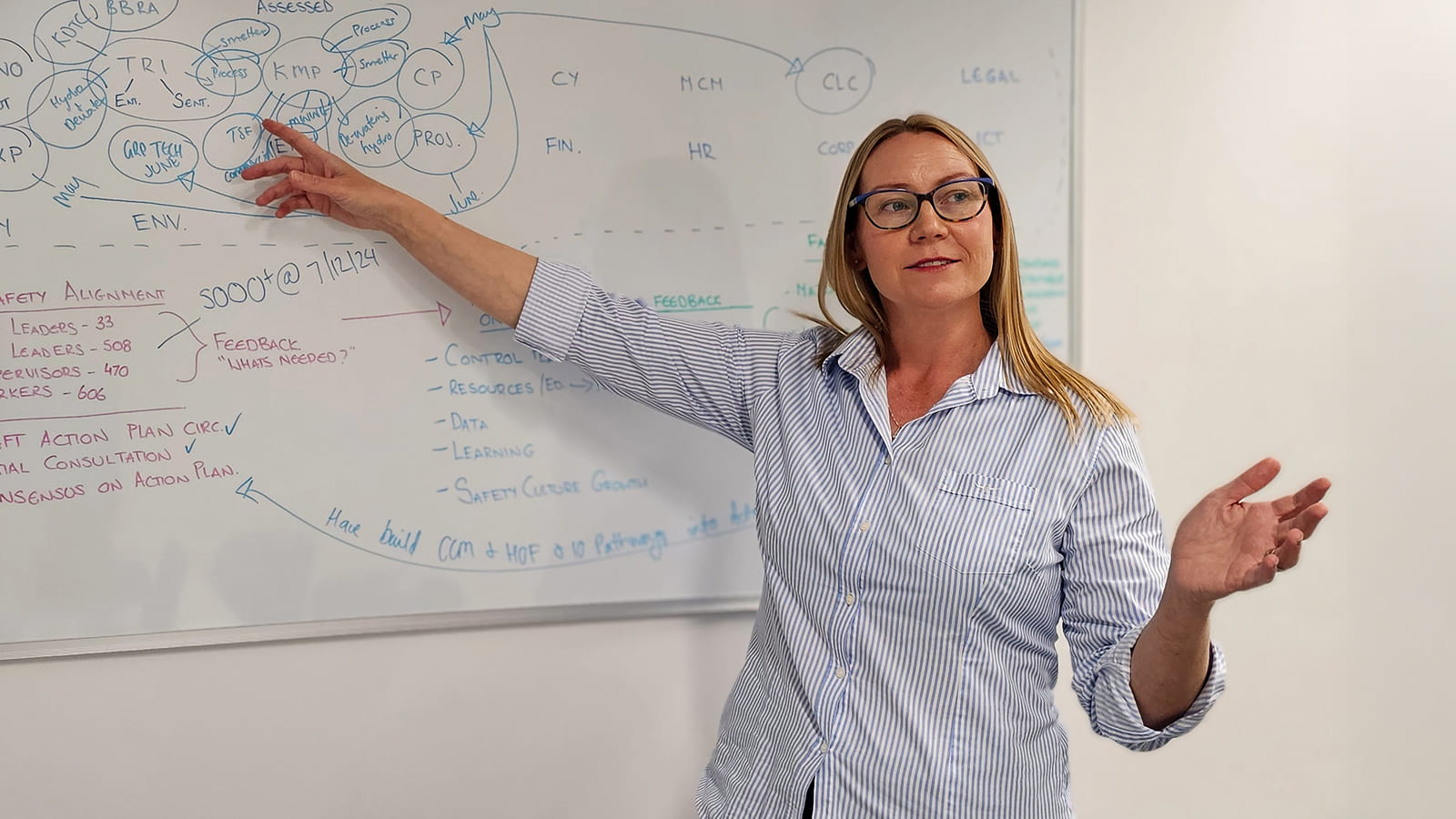

Insight
Passionate about
prevention
Hear from Christina Folley about her unique role, what drives her, and why First Quantum stands out.
Can you tell us about your role at First Quantum and what it entails?
Absolutely! I’m the Manager of Group Safety, with a specific five-year project portfolio, all aiming for safe production across the organization. This includes improving our safety culture and aligning on safety leadership. We also have Critical Control Management, our fatality prevention program, because like the rest of the industry, we are always driving towards the goal of zero fatalities.
We’re also focused on contractor safety management – they’re just as important as First Quantum employees, so we need to enhance their safety experience. Another key piece is delivering an online safety library of minimum standards for unwanted events like falls or traffic issues. We have so much good stuff, and we want to bring it together in one place, so we’re building a central, accessible library.
Finally, aligined to HR’s high-performance teams, we’re building fair and just workplace responses specifically for safety incidents. We want to build trust so that if you’re involved in an incident, you’re treated with fairness and dignity, and get a just, consistent outcome. That’s a huge aim for us. So, five key projects over five years, very focused, plus whatever else comes my way!
What makes First Quantum different from other mining companies?
We genuinely live our values: bolder, smarter, driven, together. I worked for First Quantum a decade ago and returned in the past 2 years and completely believe in these. I appreciate that we’re given a direction and then allowed to think and perform as professionals to achieve the goals. You know you’re responsible for your own success or failure. Many other organizations, so large and bureaucratic, hinder boldness and innovation. You can’t be innovative if you need ten levels of approvals or can’t get funding through multiple layers.
Here, you can pitch an idea, and they’ll say, «Leave it with me.» A week or two later, you might have approval and be on your way. It’s clear you’re an adult; if it fails, the consequences are yours. But if it’s a raging success, we’re all in your corner.
What was your first impression and what made you want to join?
I first joined in 2010, working in senior safety roles in Western Australia. When I saw the advertisement for Ravensthorpe, it basically asked if I wanted an opportunity to do something unique in safety. This interested me because I’d experienced overly bureaucratic safety structures in previous roles, which was frustrating and I felt was hindering safety progress. I wanted to move away from that.
Then, meeting the RNO leadership team and hearing them say, «I just don’t want people to leave their brains at the gate. I want them to think for themselves, be adults, perform, and use their brains every time. We don’t think we need all the rules and policies; we can do it differently.» That’s truly where the Think! concept came from – those conversations in 2010 about bringing First Quantum’s DNA to a safety context, creating «Think! Practical, Sensible, Economical safety.» It’s great that it’s still part of the organization a decade later.
What’s the best part about working at First Quantum?
I often say I’m fortunate to have worked for the regulator in Western Australia for a long time. I observed all types of mining companies – big, mid-tier, small, exploration – and I witnessed how their teams and leadership worked, or didn’t work, together. Essentially, I had front-row seats to the organizational cultures of many mining companies.
So, when the chance to return to First Quantum came up, it was a no-brainer. I knew the culture. What sets First Quantum apart is that it knows what it is. It’s confident in its identity. Many other organizations lack that confidence. First Quantum knows they’re different, they’re doing things differently, they’re testing boundaries and trying new things – but that’s the point! You can’t be bolder, smarter, and innovative without pushing boundaries. You also don’t get movement without friction, and there’s nothing wrong with respectful friction. Having had those front-row seats, I knew what First Quantum entailed, and I happily stepped right back in.
What are you most proud of achieving in your work for First Quantum?
I’m incredibly proud of leading large-scale safety and risk programs remotely and influencing and working with diverse people globally. For example, one project has involved over 120 remote workshops so far, with 20-35 engaged attendees. We discuss anything from vehicles collisions to fall prevention.
It’s that bolder, smarter, driven approach – the ability to cross oceans and still deliver high-quality work in a flexible, remote environment. M We’ve shown that if we’re conversational and inclusive, we can discuss safety anywhere, anytime. I’m very proud that this new model works and I can influence change from the other side of the world.
Secondly, our Critical Control Management, fatality prevention program, and safety culture work are, I believe, a class above anything developed in the sector so far. This work integrates human and organizational factors, the 10 known pathways to death in mining, and critical control management. We’ve learned from others’ successes and failures, integrating it all with our safety culture and Think! program. We don’t just enforce a list; we’ve consistently consulted trained people for nearly a year, empowering them as risk owners. We explain, «Safety is everybody’s responsibility,» discussing what each person can physically do to check controls and what good or bad performance looks like.
What drew you to the mining sector initially, and what advice would you give to someone considering a career in it?
Initially, I was drawn to it because I was a paramedic stationed remotely in Western Australia and inevitably crossed paths with miners. I felt myself make the move from someone interested in recovery to someone who wanted to work on prevention. It was a fork in the road. I was fortunate to then meet influential people who coached and mentored me, leading me to pivot careers and study safety while still a paramedic.
My advice to others would be similar: find your people, find your tribe. If you’re new and inexperienced, you don’t know what you don’t know Find those who do know. Ask them. Be curious. Explore all the different pathways. Secondly, just because you start down one path doesn’t mean you have to stay on it. Mining is incredibly diverse. You might start as an environmental scientist, find lab work stimulating, then realize your heart’s in emergency response. There are so many opportunities; you’re not tied down.
Would you like to see more people make that change and start working in safety?
Absolutely – it’s a young occupation, and we’re always seeking new talent. We can develop, coach, and mentor people with a passion for prevention. We know they’re in the business, just waiting to be discovered and pointed in the right direction to thrive. There might be undercover safety practitioners who are very motivated by prevention but haven’t realized this is their calling.
It’s desirable to attract these people to the safety and risk profession because it’s young, exciting, and not going away. Safety is essential. This is an occupation that won’t be replaced by AI; you need us to facilitate those conversations. It offers great job security. So, if there are any closet safety professionals out there, we’d love to hear from them!
Why do you think mining is such an important industry to the world?
There’s a great campaign in Western Australia explaining that components in your phone come from mining. I think we’re definitely shifting our global view of mining, becoming far more responsible and sustainable. But fundamentally, the world stops without the resources we mine.
Información relacionada

Manténgase actualizado
Regístrese para recibir actualizaciones con conocimientos e historias de First Quantum Minerals, nuestras operaciones, nuestros proyectos y nuestras comunidades.
Inscríbase